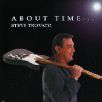If you're like me you have been playing for some time, written some songs, gigged around quite a bit and you think it's time to put your music down on CD for people to hear. I have recently done exactly that and I'd like to share some of the things that I learned. I am very proud of my newest CD which is available on Guitar9.com. It is also available along with all of my instructional books and videos on stevetrovato.com. It is not difficult to produce a CD but there are quite a few details to take care of before, during and after the music is actually recorded. Let's take a look at the process.
First,you need songs. I found that there are several ways to test the songs that you intend to record before deciding on the final mix. The first is to play the songs for a live audience. If you can put one or two in your set during the evening, the feedback you get will be very valuable. If a live audience likes the song they will let you know. Then it would probably be a viable selection for your CD. If the song is not popular after several tries with an audience, it may be time to put your ego aside and consider an alternate song.
This doesn't by any means imply that the song is not a good one but that it may need a bit of reworking or arranging. The second method of auditioning songs is to record them at home on a small cassette or disc recorder. This is called pre-production. I've found that this method works especially well for demoing solos. I've found that although it is nice to play a burning spontaneous solo, it may take several takes and several hours. If studio cost is a consideration for the project it is better to have a general direction for your solo before arriving at the studio. The bugs can be worked out a lot cheaper at home.
Next you will need musicians and/or a band. If you have your own band you know the value of rehearsing. Those long hours in the garage pay off on gig night and eventually in the studio. If you are a solo artist on the other hand, you will need musicians to play your music in the studio. These musicians are critical to the final sound of your project. You can ask around to find some quality musicians but chances are you already know some. Some time spent with the musicians rehearsing can save endless hours in the studio. Having your music charted out is also a great time saver. Either do it yourself or find someone who can. The money spent will be saved in the long run.
The Studio going to become your home for a while so get used to it. Find a studio with enough room to stretch out a bit. A tightly cramped space can contribute to flared tempers during a frustrated period of the recording process. The most important aspect of a studio should be it's ability to record a great drum sound. Nothing screams "demo" louder that a mediocre drum sound. A good drum sound usually means a high ceiling, enough tracks for the entire kit to be recorded individually and good microphones.
With the popularity of home studios it can be tempting to be your own producer, artist and engineer. This absolutely does not work. I've found that you need at least one other person in the studio with you that can be your sounding board. A person that will call you on your mistakes. A person that can listen objectively to the music being recorded and suggest changes or corrections. You don't hear any great CDs with mistakes on them. I've also found that you can't effectively engineer and be an the artist simultaneously. Each one of these tasks requires the utmost concentration. If both tasks are attempted simultaneously one will inadvertently suffer. I believe that one should get a engineer with a musical background and enough studio knowledge to get good sounds on tape (or disk) It is a plus if they have enough electronic background to troubleshoot if breakdowns in gear happen.
Remember the essence of a good recording is to get good sounds on tape. Don't spend lots of time adding effects such as reverb and delay. These are icing and should be added during the mix. This is hard to resign yourself to because a recording without effects can sound dry and uninspired. Trust me on this one. The sparkle will come in spades later on during the mix phase.
The sophistication of technology of hard disk recording software these days allows for vast editing capabilities. This will come in handy to fix minute problems in the final product. This can be a blessing or a nightmare. Be sure to find someone qualified to operate the software. A slipshod operator can mistakenly erase hours of great recording moments with the push of a button. On the other hand a good operator can work magic.
Next month I'll talk about the mix process and the plus and minuses of CD duplication houses. Until then, have fun.
Steve Trovato is a top flight guitarist from California with countless credits to his name.
Critics have labeled him 'the great chameleon' because of his ability to authentically perform in any style of guitar music.
His debut instrumental CD is entitled "About Time...".
